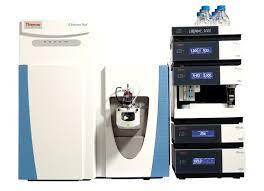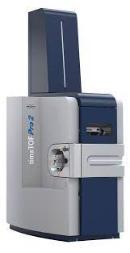Proteomics Core - Mass Spectrometry Resource
The UCD Conway Proteomics Core - Mass Spectrometry Resource facilitates study of biomolecules that play important roles in fundamental and applied biology, particularly in health and disease. Our instruments enable use of state of the art proteomics and metabolomics approaches to address your scientific problem, including quantitative proteomics, post-translational modifications, and protein-protein interactions.
We work with academic, clinical, and industry partners; from novices to experienced researchers. Our team of experts are ready to listen to your research needs and offer dedicated strategic support at all stages of your project. Contact us using the details listed in the Team & Contact Details section below.
Show/hide content Open Close All
We use two mass spectometry platforms:
- Thermo Scientific Q Exactive with Thermo Scientific Ultimate 3000 RSLCnano chromatography system. This is a hybrid ESI-LCMS instrument that combines precursor ion selection using a quadrupole with high resolution high mass accuracy (HRAM) by Orbitrap.
- Bruker tims TOF Pro mass spectrometer with Evosep One chromatography system or Bruker nanoElute chromatography system. A trapped ion mobility (TIMS) analyzer can be synchronized with a quadrupole mass filter to enable the highly efficient PASEF (Parallel Accumulation Serial Fragmentation acquisition) procedure with acquisition rates of 100 Hz.


Access to both these instruments means that we can customise to your mass spectometry analysis needs, depending on sample complexity, target abundance or analytical strategy.
Protocols
• Sample preparation for LC-MS/MS-Guidelines
• Protocol for in-gel Trypsin Digest
• Protocol for in-solution Trypsin digest (generic)
• Protocol for Filter Aided Sample Preparation (FASP)
• Sample Preparation: STAGE TIP clean up
• Protocol for Zip-Tipping tryptic digests
Software
We can help guide you to the various stages of experiment analysis, including Protein Identification and Quantitation, statistical evaluation, data mining, and pathway analysis.
Specialist analysis pipelines address applications including protein modification (PTM) analysis, de novo peptide sequencing, expresion proteomics, data-independent and data-dependent analysis (DIA, DDA). We use multicore processes operating on both Windows and Linux systems.
MaxQuant PEAKS Mascot Perseus Cytoscape Skyline
Statment on files
Raw file sizes from mass spectometry experiments are very large and we have limited storage capacity. In general, we search you raw data (MS and MS/MS spectra) using appropriate software and provide you with the results (normally a spreadsheet of protein identities and relative abundances). However, after 12 months we will delete both sets of files. We will advise you on how to store and interpret your files, but it the user's responsibility to ensure that they collect or download their own files before this date.
Gerard Cagney
Assoc. Prof. Gerard Cagney has extensive experience of mass spectrometry and proteomics, including leadership roles at UCD, UCSF and University of Toronto. He is expert in network biology, particularly protein interactions, and collaborates across many fields.
Contact: gerard.cagney@ucd.ie
Caitriona Scaife
Caitriona has worked in the field of proteomics since 2004. She ran the 2DE Separations laboratory in the Conway Institute Proteom Research Centre (CIPRC) for a number of years, under the direction of Prof. Mike Dunne. Since then she has worked on a range of mass spectometry based proteomics projects from bench work through to data analysis, primarily using a bottom-up approach.
Contact : T: (+353-1) 716 6916; E: caitriona.scaife@ucd.ie
Eugene Dillon
Eugene studied nutritional sciences in University College Cork before specialising in molecular nutrition during his MSc at Wageningen University. Eugene obtained an IRCSET Phd scholarship to work with Prof. Helen Roche and Dr Giuliano Elia utilising proteomics in the study of nutritional metabolism. After his PhD, Eugene worked as a postdoctoral scientist with Food for Health Ireland. Over the course of his doctoral and postdoctoral studies, Eugene has amassed expertise across sample preparation, mass spectrometric methodology, data processing and downstream pathway analysis.
Contact: T: (+353-1) 716 6835; E: eugene.dillon@ucd.ie

Social Media Links